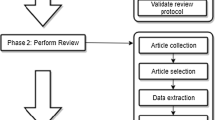Abstract
It is often illuminating to view a technology or a methodology from a novel perspective, thereby assessing it with criteria which are likely to differ markedly from those used by its designers. In this paper we review current database design methodology and, implicitly, database technology. We attempt to show that both are founded on an information-centred philosophy, and that the consequences of this view are significant and unsatisfactory. We investigate an alternative, human-centred philosophy and relate this to the more limited scope of a user-centred view which evolves from our analysis.
Similar content being viewed by others
Explore related subjects
Discover the latest articles, news and stories from top researchers in related subjects.References
Ahituv, N. and Neumann, S. (1982).Principles of Information Systems for Management. William C. Brown Company Publishers.
Bentley, T. (1982).Management Information Systems and Data Processing. Holt Rinehart and Winston.
Boden, M. (1979). The computational metaphor in psychology. In Bolton, N. (ed.)Philosophical Problems in Psychology. Methuen.
Cerri, S, and Pelagatti, G. (1984).Distributed Databases: Principles and Systems. McGraw Hill.
Clifton, H. D. (1978).Business Data Systems. Prentice Hall.
Cooley, M. (1987a). Human-centred systems: an urgent problem for systems designers.AI & Society. 1 Springer-Verlag. London.
Cooley, M. (1987b).Architect or bee?: the price of technology (revised). Langley Technical Services. Slough, UK.
Cooley, M. (1988). Creativity, Skill and Human-Centred Systems. In K. S. Gill (ed.)Knowledge, Skill and Artificial Intelligence. Springer-Verlag. London.
Date, C. J. (1981).An Introduction to Database Systems, 3rd Edition. Addison Wesley.
Deen, S. M. (1985).Principles and Practice of Database Systems. MacMillan.
Ennals, R. (1988). Can skills be transferable? In Gill, K. S. (ed.)Knowledge, Skill and Artificial Intelligence. Springer-Verlag. London.
Fernandez, E. B. Summers, R. C. and Wood, C. (1981).Database Security and Integrity. Addison Wesley.
Gill, K. S. (1988). Artificial intelligence and social action. In Gill, K. S. (ed.)Knowledge, Skill and Artificial Intelligence. Springer-Verlag. London.
Janik, A. (1988). Tacit knowledge, working life and scientific method. In Gill, K. S. (ed.)Knowledge, Skill and Artificial Intelligence. Springer-Verlag. London.
Martin, J. (1975).Computer Data-Base Organisation. Prentice-Hall.
Narayanan, A. (1986). Memory models of man and machine. In Yazdani, M. (ed.)Artificial Intelligence: Principles and Applications. Chapman and Hall.
Norman, D. A. and Bobrow, D. J. (1976). On the role of active memory processes in perception and cognition. In Cofer, C. N. (ed.)The Structure of Human Memory. Freeman.
Parkin, A. (1980).Systems Analysis. Edward Arnold.
Polanyi, M. (1967).The Tacit Dimension. Routledge and Kegan Paul.
Rauner, F. et al. (1988). The social shaping of technology and work: Human-centred CIM systems.AI & Society. 2.
Robinson, H. (1981).Database Analysis and Design. Chartwell-Bratt.
Shave, M. J. R. and Bhaskar, K. N. (1982).Computer Science Applied to Business Systems. Addison Wesley.
Schartum, D. (1988). Delegation and decentralization — computer systems as tools for instruction and improved service to clients. In Goranzon, B. and Josefson, I. (eds.)Knowledge, Skill and Artificial Intelligence. Springer-Verlag. London.
Shneiderman, B. (1987).Designing the User Interface: Strategies for Effective Human-Computer Interaction. Addison Wesley.
Tsichritzis, D. and Klug, A. (1978). The ANSI/X3/SPARC DBMS framework report of the study group on database management systems.Information Systems, 3 (3).
Ullman, J. D. (1980).Principles of Database Systems. Computer Science Press.
Vetter, M. and Maddison, R. N. (1981).Database Design Methodology. Prentice Hall International.
Weizenbaum, J. (1976).Computer Power and Human Reason: From Judgement to Calculation. Penguin.
Wiederhold, G. (1977).Database Design. McGraw Hill.
Winograd, T. and Flores, F. (1986).Understanding Computers and Cognition. Addison Wesley.
Author information
Authors and Affiliations
Rights and permissions
About this article
Cite this article
Lings, B., Adablah, N., Foster, L. et al. On a human-centred approach to database systems. AI & Soc 5, 128–141 (1991). https://doi.org/10.1007/BF01891718
Issue Date:
DOI: https://doi.org/10.1007/BF01891718




